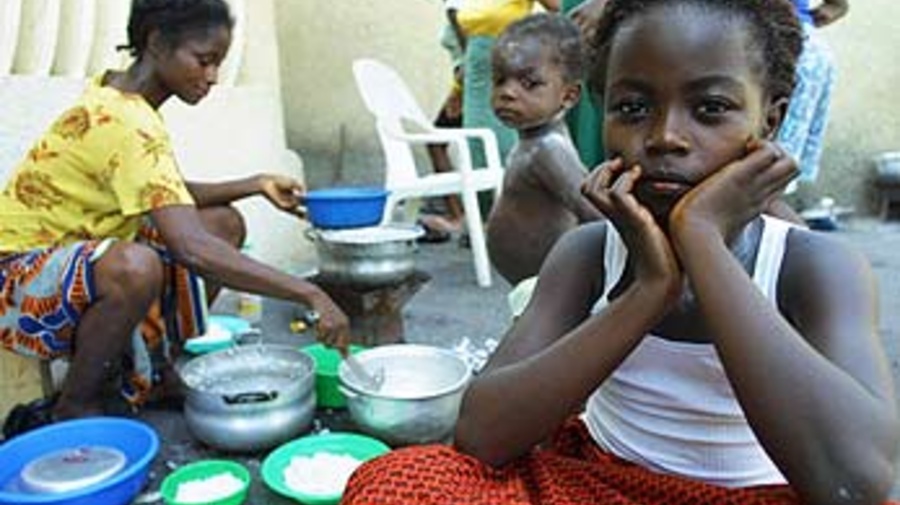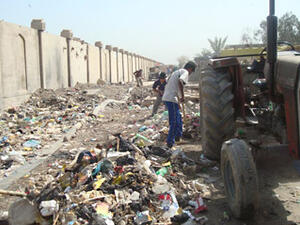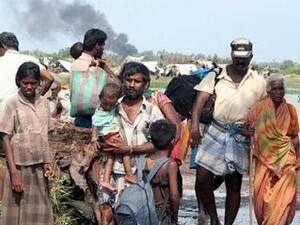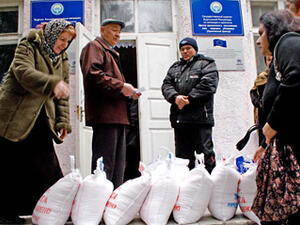UNHCR appeals for $29 million to help victims of Ivorian crisis
UNHCR appeals for $29 million to help victims of Ivorian crisis

A precarious life for Liberian refugees at a transit centre in Abidjan.
GENEVA, March 21 (UNHCR) - The UN refugee agency today launched a revised appeal for $29 million to help some 163,000 people who could be affected by a crisis in Côte d'Ivoire that has already displaced hundreds of thousands of people over the last six months.
The revised amount - part of a soon-to-be-released UN consolidated appeal for the Ivorian crisis - is an extension of an initial figure of $6.1 million UNHCR requested last December to cover three months of assistance. So far, the refugee agency has received over $6 million in contributions from Andorra, Canada, France, Germany, Ireland, Italy, Sweden, the United Kingdom and the United States.
UNHCR is already assisting 120,000 people displaced after rebel fighting started in Côte d'Ivoire last September. It needs fresh funds to help some 163,000 people of mixed populations - refugees and returnees - who could be affected in 2003. The money will be used primarily for transport, logistics and infrastructure, as well as protection, monitoring of borders and domestic items.
Among UNHCR's current caseload are 42,000 Ivorian refugees who fled their country mainly for Liberia and Guinea. The agency estimates that this figure could more than double if the situation does not stabilise rapidly inside Côte d'Ivoire.
UNHCR needs to establish new camps in Liberia, where the security situation at the border is currently hampering relief efforts. In Guinea, refugees have been transferred to existing camps that need urgent site rehabilitation or extension to cater for the new influx.
Meanwhile, Liberian refugees in Côte d'Ivoire are finding themselves in an extremely vulnerable situation, facing hostility, harassment and military recruitment by the warring factions. Many of them cannot return to Liberia because of their ethnic and political background.
More than 40,000 Liberians who were living in western Côte d'Ivoire have been compelled to return home since fighting spread to their region in November. This figure could still increase by another 15,000. UNHCR has assisted them with transport home, or to camps for the displaced for those whose areas of origin remain unsafe.
So far, the assistance has been limited because of the unexpected pace and size of the returns. UNHCR plans to extend its transit facilities and provide each returnee with a basic assistance package. It also hopes to provide some support to the communities of return, including rehabilitating schools and hospitals and improving the water and sanitation systems.
The refugee agency estimates that 35,000 Liberians remain in Côte d'Ivoire today. It is planning to evacuate some 5,000 extremely vulnerable Liberians to a third country in the region. As many continue returning home spontaneously, UNHCR estimates that about 10,000 Liberian refugees will eventually remain in Côte d'Ivoire. It has asked the Ivorian government to identify a new site in a safe area where refugees from Nicla camp and from Abidjan can receive protection and assistance.
To carry out essential distribution of basic items, UNHCR has established an emergency regional stockpile in Accra, Ghana, with sufficient relief material for 20,000 people. The stockpile will be extended to cater for 50,000.









